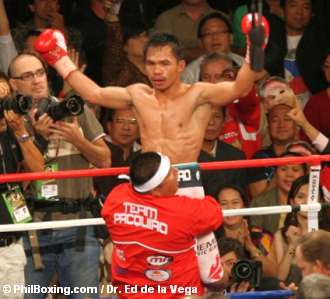
|
Philippines, 19 Oct 2025 |
Home >> News |
 |
||||
|
|
|
|
The Enduring Influence of Flash Elorde and Manny Pacquiao (Part 3) By Teodoro Medina Reynoso PhilBoxing.com Fri, 29 May 2020  The First Golden Age of Philippine Boxing started with flyweight champions Pancho Villa, Small Montana, Little Dado and Ceferino Garcia, the first Filipino and Asian to win the world middleweight title, that spanned from the Roaring Twenties through the prewar and wartime years. Flash Elorde ushered in the Second Golden Era in the 1960s that extended to the 90s through fighters as Ben Villaflor and Luisito Espinosa. Manny Pacquiao triggered the Third Golden Era at the start of the new millennium which we are still enjoying to this day. What makes Pacquiao stand out was that he duplicated the accomplishments of Pancho Villa and Elorde and almost equaled the rare feat of Ceferino Garcia, coming short just one division below, at junior middleweight, in winning a record high eight world championships in as many weight classes. That catapulted him from being a well loved local boxing idol into an admired and esteemed global sport icon. From Local Idol to Global Icon Pacquiao already had a growing legion of loyal, adoring fans before he won his first world title in Thailand by knocking out Chatchai Sasakul for the WBC and lineal flyweight championship in December 1998. Sasakul had earlier won those titles from Russia's Yuri Arbachakov, undisputedly the best flyweight fighter and champion of the 90s. That legion of fans grew even more after he won his second world title via sensational eighth round knockout of South Africa's Lehlo Lebwaba in his US ring debut in 2001 for the IBF super bantamweight championship. But what initially propelled Pacquiao to his stature as a full fledged Filipino boxing idol and icon and a highly potential international boxing crossover superstar was his astounding stoppage victory over Marco Antonio Barrera, then bruited as heir apparent to Mexico's greatest Julio Cesar Chavez. That gave him his third lineal world boxing championship at featherweight though he came in as the overwhelming pre-fight underdog. How special and significant was that victory? The editor in chief of the Ring Magazine, the so called bible of boxing, Nigel Collins, traveled all the way to personally present the Ring championship belt to Manny in Manila a few days later. Though Manny was denied the official world championship with the WBC withholding its sanction a day before the fight, he was universally recognized as the People's Champion, a honorific that only Muhammad Ali was conferred upon his return to boxing in 1970 as the uncrowned true heavyweight champion of the world. Being compared to Ali was a signal honor for Manny that was not lost to his millions of fans. That started deluge of invitations from networks for guest appearances and offers from various companies for him to do commercials and advertisements endorsing their products. His succeeding epics versus another fine and famous pair of Mexican fighters and champions as Juan Manuel Marquez and Erik Morales also triggered offers from film producers bidding to do commercial movies about him. His trajectory to global acclaim continued with his winning his fourth and fifth world boxing titles at junior lightweight over Marquez and at lightweight over David Diaz, winning him respect and admiration from more American and even Mexican as well as other Latino fans. But what really skyrocketed him to global boxing superstardom was his fight and dominating stoppage by retirement victory over erstwhile icon Oscar de la Hoya in 2008. Only still a lightweight, though already the WBC beltholder, he agreed to fight Oscar who had fought and won world titles in as high as the middleweight, at the catchweight of 147 lbs., the welterweight limit. Apart from spotting his opponent by several inches in height and reach, Manny also was the prohibitive underdog and had to agree to a highly onerous 15-85 split in fight purse and other related revenues. Manny bucked all those and gave Oscar a hellacious beating from virtually the opening bell forcing the Golden Boy to quit in his corner at the end of the eighth round. Oscar would announce his retirement from boxing afterwards. The victory though without any title at stake effected the passing of the torch from the old superstar to the new and the former cashcow to the next. This was aided by the retirement earlier of American superstar boxer Floyd Mayweather Jr. It also zoomed Manny Pacquiao to the top of the best pound for pound fighters list. His succeeding victories over Ricky Hatton, Miguel Cotto and Antonio Magrarito for his sixth, seventh and eighth world division championships between 2008 and 2010 only served to confirm these. All the while, these glittering individual feats of Manny have the effect of further invigorating Philippine boxing giving rise to other world class Filipino fighters who would give honor and glory to the country and people. To be continued... The author Teodoro Medina Reynoso is a veteran boxing radio talk show host living in the Philippines. He can be reached at teddyreynoso@yahoo.com and by phone 09215309477. Click here to view a list of other articles written by Teodoro Medina Reynoso. |
|
|
PhilBoxing.com has been created to support every aspiring Filipino boxer and the Philippine boxing scene in general. Please send comments to feedback@philboxing.com |
PRIVATE POLICY | LEGAL DISCLAIMER
developed and maintained by dong secuya © 2025 philboxing.com. |